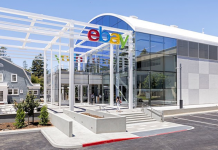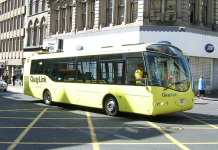Tom Konrad CFA
I’m attempting to bring this series on peak oil stocks to a conclusion in which I can choose five stocks that should benefit from rising oil prices. One sector I feel should be represented is suppliers to mass transit companies, but I only looked at the percentage of revenues coming from mass transit and rail when I brought you my list of nine mass transit stocks. From that list, the following companies get substantially all their revenues from mass transit, passenger rail, or rail freight:
- New Flyer Industries (NFYIF.PK/NFI-UN.TO), is the largest manufacturer of heavy-duty transit buses in North America, and has been a long-time favorite of mine. The company trades in Toronto under the ticker NFI-UN, which is an unusual “stapled” security consisting partly of company stock and partly of a high-yield bond, giving it a much higher yield than most other companys. This makes apples-to-apples comparisons with different stocks difficult, but I’ll do my best.
- Vossloh AG (VOS.DE) supplies rail fastening systems, switching, services, and both diesel and electric locomotives, including locomotives for high speed rail. Their electrical systems unit supplies electric drivetrains for both locomotives and trolley buses.
- While Portec Rail Products (PRPX) is a pure-play rail supplier, I’m not going to include it in this comparative valuation because the stock is currently trading based on the a takeover offer from L. B. Foster (FSTR). This offer is on hold pending a ruling from the US Department of Justice, but L.B. Foster is confident enough of obtaining final approval (after some asset dispositions) that they increased the offer price to $11.80 per Portec share and agreed to pay $2 million to Portec if they are unable to consummate the deal by the end of the year in order to induce Portec to extend the agreement when the original offer expired on August 30.
- Wabtec Corporation (WAB), primarily serves the freight and passenger rail industries, supplying braking and other safety systems for both rail cars and locomotives.
One last company I will add to the list is the Spanish firm Construcciones y Auxiliar de Ferrocarriles (CAF.MC), also known as CAF. A reader suggested I look into CAF shortly after the publication of the original list of transit stocks. CAF manfactures railway cars, components, and complete turnkey rail systems. In 2009, 58% of revenues came from Spain, rapidly growing international operations accounting for the balance of 43%.
Valuation and Liquidity
The following table lays out several important valuation and liquidity ratios for these companies:
| Company | New Flyer | Vossloh | Wabtec | CAF |
| Ticker | NFI-UN.TO | VOS.DE | WAB | CAF.MC |
| Share Price 9/7/2010 | C$11.51 | €80.18 | US$45.84 | €345.15 |
| Financial Stmt Date | 6/30/2010 | 6/30/2010 | 3/31/2010 | 12/31/2009 |
| TTM Earnings Yield | 0.05% | 9.1% | 5.1% | 10.5% |
| P/E | 218 | 11.0 | 19.4 | 9.5 |
| TTM Free Cash Flow Yield | 6.6% | 5.1% | 0.1% | -0.7% |
| Dividend Yield | 10.2%* | 2.5% | 0.1% | 3.0% |
| Net Debt/Equity | 5.75 | 1.5 | 0.8 | 3.8 |
| Current Ratio | 1.35 | 1.6 | 2.4 | 1.1 |
| YoY Sales Growth | 2.6% | 14% | 4% | 25% |
* Note: The yield on New Flyer’s securities is not comparable to the other numbers in this chart because it includes the value of interest payments on the debt portion of the security
The only one of the four I currently own is New Flyer. The bus manufacturer is returning to profitability after a year of losses caused by the downturn and an unexpected delay in an order from a large customer. This has caused fairly strong price appreciation for what I consider an income security, so I have recently sold a little over a third of my holdings in order to rebalance my portfolio.
Wabtec and CAF both show weak free cash flow. For Wabtec, this reflects a temporary surge in investment to support future growth. In my opin
ion, Wabtec’s strong balance sheet, with its low debt and a strong current ratio, should be sufficient to sustain this planned surge in investment.
CAF’s low free cash flow seems to reflect a surge in working capital with the build-out of current projects. Since CAF contracts to build entire turnkey transit facilities, large surges in working capital requirements are part of its normal course of business.
Vossloh seems the best overall value of the four, with an inexpensive price/earnings ratio of 11, decent growth and dividends that are well covered by income and cash flow. The company does not have excessive debt, and maintains a moderate liquidity buffer.
Conclusion
Vossloh AG seems like the best buy of these four at current prices. The conservatively managed balance sheet and moderate Price to Earnings ratio of 11 mean this company should be able to weather continued economic weakness, while still being able to benefit from any potential increased investment in mass transit systems.
DISCLOSURE: Long NFYIF and PRPX.
DISCLAIMER: The information and trades provided here are for informational purposes only and are not a solicitation to buy or sell any of these securities. Investing involves substantial risk and you should evaluate your own risk levels before you make any investment. Past results are not an indication of future performance. Please take the time to read the full disclaimer here.






